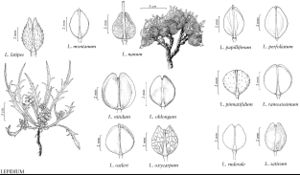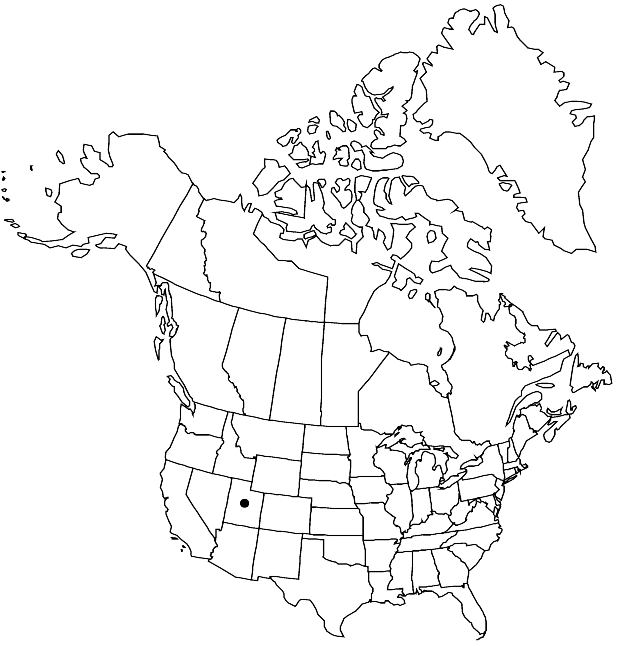Difference between revisions of "Lepidium ostleri"
Great Basin Naturalist 40: 80, fig. 3. 1980.
FNA>Volume Importer |
imported>Volume Importer |
||
| (5 intermediate revisions by 2 users not shown) | |||
| Line 6: | Line 6: | ||
|place=40: 80, fig. 3. 1980 | |place=40: 80, fig. 3. 1980 | ||
|year=1980 | |year=1980 | ||
| + | }} | ||
| + | |special_status={{Treatment/ID/Special_status | ||
| + | |code=F | ||
| + | |label=Illustrated | ||
| + | }}{{Treatment/ID/Special_status | ||
| + | |code=E | ||
| + | |label=Endemic | ||
| + | }}{{Treatment/ID/Special_status | ||
| + | |code=C | ||
| + | |label=Conservation concern | ||
}} | }} | ||
|basionyms= | |basionyms= | ||
| Line 33: | Line 43: | ||
-->{{#Taxon: | -->{{#Taxon: | ||
name=Lepidium ostleri | name=Lepidium ostleri | ||
| − | |||
|authority=S. L. Welsh & Goodrich | |authority=S. L. Welsh & Goodrich | ||
|rank=species | |rank=species | ||
| Line 47: | Line 56: | ||
|publication title=Great Basin Naturalist | |publication title=Great Basin Naturalist | ||
|publication year=1980 | |publication year=1980 | ||
| − | |special status= | + | |special status=Illustrated;Endemic;Conservation concern |
| − | |source xml=https:// | + | |source xml=https://bitbucket.org/aafc-mbb/fna-data-curation/src/2e0870ddd59836b60bcf96646a41e87ea5a5943a/coarse_grained_fna_xml/V7/V7_953.xml |
|tribe=Brassicaceae tribe Lepidieae | |tribe=Brassicaceae tribe Lepidieae | ||
|genus=Lepidium | |genus=Lepidium | ||
Latest revision as of 22:37, 5 November 2020
Perennials; (pulvinate, caudex woody, many-branched, covered with persistent petiolar remains); densely (grayish) puberulent. Stems simple from base (caudex branch), erect to ascending, unbranched distally, (0.1–)0.3–0.8 dm. Basal leaves not rosulate; petiole often undifferentiated, (expanded base to 2 mm); blade (somewhat fleshy), linear to linear-oblanceolate (when margins entire), or spatulate in outline (when apically 3–5-lobed, lobes obovate to oblong), 3–12(–15) cm × 5–15 mm, margins entire. Cauline leaves sessile; similar to basal, smaller, base not auriculate. Racemes slightly elongated in fruit; rachis puberulent, trichomes straight or curved, cylindrical. Fruiting pedicels divaricate-ascending to subhorizontal, straight or slightly curved, (not winged), (2.5–)3–5(–6.5) × 04–0.5 mm, densely puberulent throughout. Flowers: sepals orbicular to broadly obovate, 1.5–2(–2.5) × 1–1.5(–2) mm; petals white to pale purple, suborbicular to obovate, 2–3.5 × 1.5–2.5(–2.8) mm, claw to 0.5 mm; stamens 6; filaments 1.5–1.8 mm, (glabrous); anthers 0.3–0.5 mm. Fruits ovate, 2.5–3.5(–4) × 2–2.5(–3) mm, apically winged, apical notch 0.05–0.2 mm deep; valves thin, smooth, not veined, glabrous; style 0.3–0.6 mm, exserted beyond apical notch. Seeds ovate, 1.2–1.5 × 0.9–1.1 mm.
Phenology: Flowering May–Jun.
Habitat: White limestone outcrops and gravel, pinyon-juniper, sagebrush, or pine communities
Elevation: 1700-2100 m
Discussion
Of conservation concern.
Lepidium ostleri is known only from the San Francisco Mountains in Beaver County.
Selected References
None.

